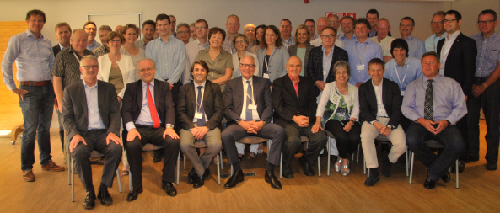



Poultry Health Issues Top Agenda at EU Egg, Chick Association
SPAIN - At its recent meeting in Barcelona, EPEXA (Association of European Hatching Eggs, One-Day Olds and Pullet Exporters in EU Countries) discussed the challenges of poultry health issues for international trade and agreed to join forces with two other groups to form ELPHA, a larger association to promote the sector.EPEXA, with representatives from 13 EU Member States founded in 1987, held its 27th General Assembly in Barcelona from 12 to 15 June 2014.
Establishment of ELPHA
The President of EPEXA, Jacques de Lange, welcomed 43 members in the meeting, which is probably an all-time record.
Great attention has been paid to the future structure of promoting the interests of the production and trade of hatching eggs and live poultry towards the European institutions. The presidents of EPEXA, AEH (Association of European Hatcheries) and EPB (European Poultry Breeders) have worked jointly on creating a new and larger association to promote their industry, which will be called ELPHA.
The proposal to join forces in this new alliance was approved by the EPEXA General Assembly. As the members of AEH and EPB also support this move, it is the objective that ELPHA will become active on 1 January 2015.
Current state of sector
The President of EPEXA highlighted in his speech the challenges for European poultry producers and the important issues reported by the members.
Incidents of animal diseases in countries both inside and outside the EU are often interfering with the activity of individual businesses. Fortunately, in recent years, these incidents have been rare in the EU-28. Nevertheless, traders of hatching eggs and day-old chicks are still faced with situations, both positive and challenging.
Mr de Lange posed to the group the question on how the future would look, since in countries as Germany, Great Britain and the Netherlands, the society is critical and demands changes that are impacting on the competitiveness of the producers in these countries. Would it be possible that the bilateral trade agreements may create a situation that we have to compete on the EU-market with hatching eggs or chicks from third countries?
Being able to comply with the veterinary and sanitary requirements demanded by an importing third-country is paramount for the exporters in the EU-28. The advantage of the EU-28 market is that it functions as an internal market, which means that the same rules apply in the different member states and that the poultry and hatching eggs compliant with these rules may move freely throughout the EU.
As regards to the EU, the same conditions apply for imported hatching eggs and day-old chicks, no matter by which member state they will be imported and thereafter they are free to move between member states.
For the benefit of the functioning of the internal market, third-countries should not impose different conditions and criteria on hatching eggs and day-old chicks dependent on the EU member state they are originating from.
EPEXA is promoting strongly more cooperation and coordination at European level to achieve that the veterinary certificates of the different member states for export of hatching eggs and day-old chicks are harmonised well.
The support of the European Commission and the individual member states is needed for this and with the involvement of EPEXA it will improve the competitive power of the EU-28 against third countries that are expanding their poultry production.
Poultry meat and egg industries in Spain and Portugal
Rafael Gill Evangelista, Director of Cobb Spain, presented the profile of the Spanish poultry meat and egg sector and the trends, challenges and opportunities seen. It is evident that the Spanish and Portuguese markets are closely connected and may be considered as one market.
He showed the results of the continuous monitoring of the image of poultry meat with Spanish consumers. They seem to have no interest in organic poultry products, both meat and eggs. He questioned about how long the recent remarkable trend that Spanish consumers purchase more whole chicken and less cuts is going to continue especially when they will have overcome the economic crisis.
Profile of the trade of hatching eggs and day old chicks
In 2013, the European Union exported more than 920 million hatching eggs to third countries, of which five million were from turkeys, and about 170 million one-day olds, of which 24 million were layers and 14 million turkeys.
The total annual trade value of hatching eggs, including the intra-community trade of about 1.1 billion hatching eggs, amounts at more than €560 million.
The next EPEXA General Assembly is planned to be held from 11 to 14 June 2015 in the Netherlands, and it will likely be the first General Assembly of ELPHA.









